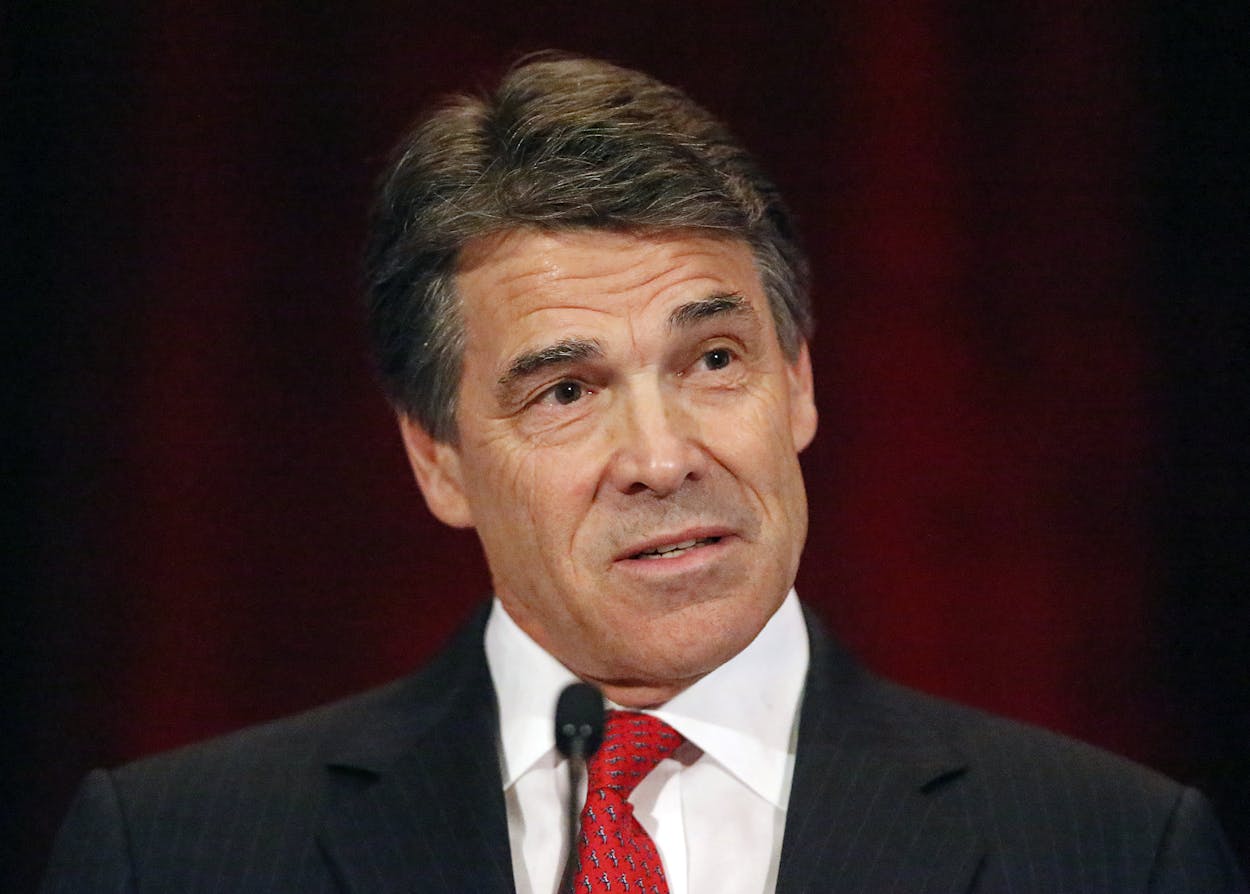Rick Perry Gets Pranked
Two Russian pranksters managed to score some phone time the U.S. Energy Secretary Rick Perry. The pranksters, Vladimir Krasnov and Alexei Stolyarov, pretended to be the Ukrainian Prime Minister Volodymyr Groysman. CNN reports that the call took place last Wednesday, and the Department of Energy confirmed that Perry had indeed been pranked. “Secretary Perry is the latest target of two Russian pranksters,” said Shaylyn Hynes, a spokesperson for the department. “These individuals are known for pranking high-level officials and celebrities, particularly those who are supportive of an agenda that is not in line with their governments. In this case, the energy security of Ukraine.” During the more-than-twenty-minute phone call (an edited version of which is available online), Perry said he looked forward to meeting Groysman in person and discussing “energy strategies that are good for both countries.” According to the Washington Post, one of those strategies the pranksters suggested during the phone call was a new type of biofuel made out alcohol and pig poop, and supposedly invented by the Ukrainian President Petro Poroshenko. Unfortunately for Perry (who expressed interest in learning more about it), this biofuel doesn’t exist.
Bastrop Oil Spill Bigger Than Originally Reported
A new report on an oil spill that took place in Bastrop County on July 13 reveals a larger spill than was originally reported. A pipeline owned by Magellan Midstream Partners was ruptured when it was hit by an excavator during routine maintenance, spilling what the company first estimated to be about 50,000 gallons of crude oil along FM 20. The Austin American-Statesman reports that on Monday, State Representative John Cyrier said the pipeline spilled more than 82,000 gallons of oil, which is “a substantial increase from earlier reports.” Magellan spokesperson Thomas Byers explained Tuesday that the initial amount reported was based on an estimate made by the company with the information they had available at the time. The pipeline was repaired and operating normally again by July 16.
Texas Comes Out on Top in Renewable Energy
In an article by CBS News’ Irina Ivanova, Texas is a somewhat surprising leader in the in the use of renewable energy. Renewable energy goals set by the state in 1999 and 2005 might be why Texas is the state producing “the most renewable energy in terms of sheer quantity,” surpassing even California. (We’ve finally done it, we’ve managed to out-California California.) One example that Ivanova cites is Georgetown, which has been operating entirely on renewable energy since 2012. A recently published report by Environment America and Frontier Group has Texas leading as the state with the most wind generation capacity. From the report:
Texas, Oklahoma, Iowa, Kansas and Illinois experienced the greatest total increases in wind energy generation from 2007 to 2016. Texas’ policies to upgrade its grid to accommodate more wind power from rural west Texas played an important role in the boom.
For those states pursuing renewable energy, they benefit from both the environmental and the economic upsides. Wind and solar energy is free and limitless and thanks to advancements made in storage technology, it’s getting increasingly easier to store wind and solar energy for later use. The future looks green in Texas.
JPMorgan to Switch To Renewable Energy By 2020
On Friday, JPMorgan Chase announced that the company would be using 100 percent renewable energy by 2020. As part of their plan to get greener, CNBC reports that JP Morgan will install “large-capacity fuel-cell technology at commercial sites and small-capacity fuel cells at retail sites” as well as on-site solar power generators at both retail and commercial locations. The company will also install solar panels at Chase locations in California and New Jersey as part of a pilot program and partner with General Electric’s Current to switch to LED lights in about 4,500 Chase locations. The company will also participate in $200 billion in “clean financing” which will involve financing “client projects and companies to facilitate new energy, transportation, waste management, water treatment and technology innovations.” In a statement, JPMorgan CEO Jamie Dimon explained the company’s new direction: “Business must play a leadership role in creating solutions that protect the environment and grow the economy. This global investment leverages the firm’s resources and our people’s expertise to make our operations more energy efficient and provide clients with the resources they need to develop more sustainable products and services.” According to the firm, JPMorgan has offices in more than 60 countries across over 5,500 properties, including over nearly 650 branches in Texas.
- More About:
- Energy
- Rick Perry








